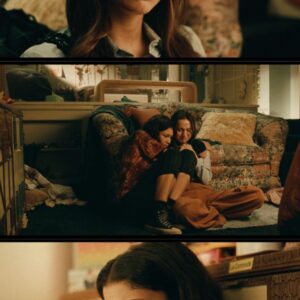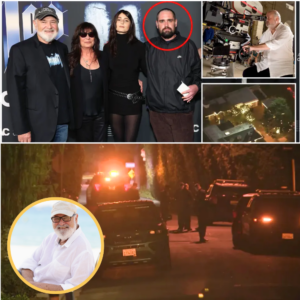In the relentless churn of streaming content, where algorithms dictate destiny and overnight sensations rise like tidal waves, few shows arrive with the quiet ferocity of Accused. This British anthology masterpiece, originally crafted by the unflinching pen of Jimmy McGovern and unveiled on BBC One back in 2010, has slithered onto Netflix in September 2025 like a shadow slipping through courtroom doors. No fanfare, no glossy trailers hijacking your feed—just a subtle addition to the library that exploded into the Top 10 charts within days. Now, as October’s chill sets in, Accused isn’t just trending; it’s tearing through binge lists with the raw, unrelenting force of a guilty verdict. Harder-edged than the procedural chill of Mindhunter, darker in its dissection of human frailty, and more twisted in its refusal to hand out easy answers, this six-hour gut-punch (across two seasons of standalone episodes) has viewers canceling plans, debating verdicts in group chats, and questioning their own ethical fault lines. If you’ve ever dismissed cop shows as formulaic chases and tidy resolutions, Accused will dismantle that illusion episode by episode, leaving you haunted by the what-ifs of ordinary lives gone catastrophically awry.
What makes Accused such a sleeper assassin in Netflix’s arsenal? At its core, it’s a radical reinvention of the crime drama, stripping away the badge-flashing bravado and forensic fireworks for something far more intimate and insidious: the slow unraveling of the soul. Each episode—self-contained, mercilessly paced at around 60 minutes—opens in a stark British courtroom, the accused shuffling toward the dock like a condemned ghost. We know nothing: no crime, no motive, no heroes or villains. Just a face—flushed with dread or defiance—and then, in a seamless flashback whirl, we’re plunged into the defendant’s fractured perspective. No omniscient narration, no procedural sidekicks cracking wise; McGovern demands you live it, feel the inexorable slide from normalcy to nightmare. It’s a format borrowed from the golden age of anthology TV but weaponized for the modern era, where true-crime podcasts and viral trials have numbed us to spectacle. Here, the real horror isn’t the act itself but the banal choices that cascade into catastrophe— a lie to protect a loved one, a momentary lapse in judgment, a desperate grasp at redemption that dooms you deeper.
Premiering quietly amid Netflix’s autumn slate—sandwiched between glossy reboots and reality trainwrecks—Accused hit the platform on September 10, 2025, and rocketed to number five in the UK Top 10 by week’s end, holding steady at number four as of mid-month. Viewer hours spiked 300% in its first seven days, per Netflix’s internal metrics, outpacing fresh imports like Swedish thrillers and rom-com revivals. Social media ignited like a flash mob: #AccusedNetflix trended UK-wide, with posts like “WTF, this 2010 gem just gutted me harder than any new show. McGovern’s a wizard” racking up 20K retweets. On Reddit’s r/television, threads ballooned to 5K upvotes, fans dissecting twists with the fervor of Succession stans. “It’s Black Mirror meets The Undoing, but grittier, realer,” one user raved. Another confessed, “Binged season one overnight—couldn’t sleep after. This isn’t entertainment; it’s an ethics exam you fail.” The obsession stems from its stealth: no pre-release hype, just word-of-mouth alchemy turning casual scrolls into all-nighters. In a platform bloated with predictability, Accused feels like contraband—smuggled insight that hits like contraband truth.
McGovern, the Liverpool-born titan behind gut-wrenchers like Cracker and Time, conceived Accused as a riposte to the glossy injustices of TV lawyering. “We see the crime and the punishment—nothing else,” he declared at its BBC launch, scorning the “coppers striding corridors” trope for raw, unfiltered humanity. Produced by RSJ Films in Manchester’s rain-slicked streets, the series spans 2010-2012 across two seasons (10 episodes total), each a bespoke tragedy drawn from the headlines but twisted into universal parables. No recurring characters, no serialized arcs—just pure, episodic immersion that mirrors life’s arbitrary cruelties. It’s darker than Mindhunter‘s clinical killer dissections because it indicts us all: not the monsters in the shadows, but the everyday folks whose “one wrong turn” snowballs into oblivion. Where Jonathan Groff’s FBI profiler intellectualized evil, McGovern’s accused bleed it—messy, relatable, unforgivable.
Take the series’ blistering opener, “Helena’s Story” (Season 1, Episode 1), starring Olivia Colman in a pre-The Crown tour de force that still stings like fresh ink. Colman plays Helena, a harried schoolteacher whose life implodes when her terminally ill husband begs her to end his suffering. What unfolds is a masterclass in escalating dread: stolen morphine from a pharmacy, a fumbling injection in a dimly lit bedroom, the husband’s final rasp echoing like a death knell. Flashbacks layer in the marital tenderness—their seaside holidays, her whispered vows—making the mercy-killing not a thriller beat but a soul-shattering dilemma. As Helena mounts the dock, her eyes (Colman’s specialty: wide, wounded, weaponized) plead for absolution, forcing viewers to jury-rig their own verdict. “Was it love or murder?” the episode doesn’t answer; it eviscerates you for asking. Colman’s raw howl in the witness box—snot-streaked, unhinged—earned her a BAFTA nod and remains a benchmark for anthology anguish. Critics at the time hailed it as “television that doesn’t just entertain; it interrogates,” and on Netflix, it’s spawning reaction videos by the dozen.
Season 1 barrels on with “Frankie’s Story” (Episode 2), where Stephen Graham unleashes his signature volatility as a debt-ridden cabbie cornered by loan sharks. Graham’s Frankie starts as every-man charm—bantering with fares, doting on his autistic son—but spirals into a botched robbery that leaves a security guard paralyzed. The twist? Frankie’s “insurance policy” was a hidden camera in the cab, capturing his descent in unflinching detail. McGovern’s script peels back layers of macho fragility, exposing how economic despair festers into violence. Graham, all coiled rage and sudden tears, chews the scenery without overplaying, his courtroom breakdown a seismic “By order of the court” gut-punch. It’s dirtier than Mindhunter‘s Ed Kemper chats—less about psychopathology, more about the socioeconomic shrapnel that turns breadwinners into breakers. Viewers report pacing the floor post-episode, haunted by Frankie’s parting shot: “I did it for him… what would you do?”
The anthology’s breadth is its blade: each tale a fresh incision into Britain’s underbelly. “Alison’s Story” (Season 1, Episode 3) features Sheridan Smith as a suburban mum whose online flirtation curdles into blackmail and a fatal shove down the stairs— a prescient skewer of digital-age infidelity that feels ripped from 2025 headlines. Jodie Whittaker, pre-Doctor Who, brings feral intensity to “Tracie’s Story” (Episode 5), a care worker accused of elder abuse after her Alzheimer’s patient accuses her of theft in a haze of delusion. The episode’s masterstroke? Intercutting Tracie’s grueling shifts with the patient’s fragmented memories, blurring innocence and gaslighting in a way that rivals The Sixth Sense‘s ambiguity. Over in Season 2, “Betty’s Story” (Episode 1) casts Anna Maxwell Martin as a no-nonsense prison officer whose corruption scandal unravels a web of inmate alliances gone toxic—raw, riotous, and redolent of Screw‘s penology grit. Sean Bean’s “Willie’s Story” (Season 2, Episode 3) delivers a gut-wrencher: a laid-off miner turned poacher, whose hare-brained heist ends in a fatal shootout, echoing class-war elegies like The Full Monty but laced with lethal irony.
The casting is a veritable murderers’ row of British talent, each episode a pop-up masterclass. Christopher Eccleston broods through “Liam’s Story” (Season 1, Episode 6) as a paranoid veteran whose PTSD-fueled rampage torches his family home—his Ninth Doctor gravitas twisted into tragic unraveling. Peter Capaldi’s “Peter’s Story” (Season 2, Episode 2) is a venomous delight: a sleazy solicitor accused of perjury, his Twelfth Doctor wit weaponized in a web of lies that ensnares everyone. Naomie Harris ignites “Mo’s Story” (Season 1, Episode 4) as a undercover cop whose identity leak sparks a revenge killing, her poise cracking into primal fury. Anne-Marie Duff, Juliet Stevenson, Andy Serkis, Marc Warren, Tom Ellis, John Bishop—they all rotate in, elevating potboilers to poetry. Directors like David Blair and Julia Ford wield handheld cams and natural light to amp the verité vibe, shot in Manchester’s fog-choked alleys and Liverpool’s looming courts for that inescapable Northern authenticity. McGovern’s dialogue—terse, profane, poetic—lands like verdicts: “Guilty of being human,” one character spits, encapsulating the series’ savage empathy.
Why does Accused eclipse Mindhunter‘s brooding forensics? David Fincher’s series was a cerebral autopsy of killers, all procedure and period polish; McGovern’s is a vivisection of the accused, visceral and verdict-free. No tidy profiles or heroic breakthroughs—just the messy morality of flawed folk, amplified by 2025’s trial-by-TikTok zeitgeist. In an age of Making a Murderer marathons and The Jinx jaw-droppers, Accused thrives on ambiguity: half the episodes end in acquittals that feel pyrrhic, convictions that ring hollow. It’s twisted because it trusts you to judge, darker because it mirrors our complicity—how many “good people” teeter on that dock? Production was lean and mean: £4 million per season, filmed in 2010-2011 amid BBC budget squeezes, yet its intimacy outshines Netflix’s $200M behemoths. Renewed for Season 2 after Season 1’s 7 million viewers, it bowed out on a high, spawning a 2023 Fox remake (starring Michael Chiklis and Whitney Cummings) that’s competent but lacks the original’s soul-scalpel.
The Netflix resurgence? Timing’s everything. Dropped amid a true-crime glut—post-Baby Reindeer, pre-holiday slogs—Accused fills a void for smart, substantive scares. Its 92% Rotten Tomatoes audience score (from 1,200+ ratings) and 7.9/10 IMDb average underscore the grip: “Blown away! Stellar cast under brilliant direction,” one fan gushed. The Guardian retroactively dubbed it “British TV’s best-kept secret,” while Digital Spy noted its “palm-sweating propulsion” in 2025 reviews. Backlash? Minimal—some decry the unrelenting bleakness (“It’s therapy, not telly,” quipped a detractor), but most embrace the catharsis. McGovern, now 76, has teased no revival, but whispers of a third season swirl, fueled by this streaming phoenix.
Accused isn’t binge fodder; it’s a reckoning. It slips in unannounced, hooks you with Colman’s tears or Graham’s growl, then unleashes episode after episode of ethical evisceration. By finale credits—say, after Robert Sheehan’s coke-fueled implosion in “Stevie’s Story” (Season 2, Episode 5)—you’re not entertained; you’re altered. Rethinking Line of Duty‘s copaganda? Check. Questioning your own “what would I do?” in a crisis? Double check. As one X post viralized: “Accused on Netflix: the show that makes you love hating justice.” Don’t blink—because in McGovern’s world, one missed cue lands you in the dock. And once you’re there, there’s no turning back.

